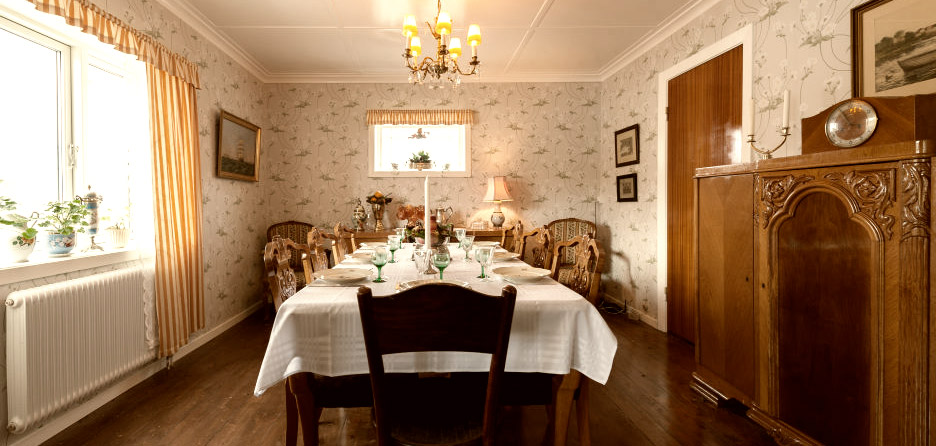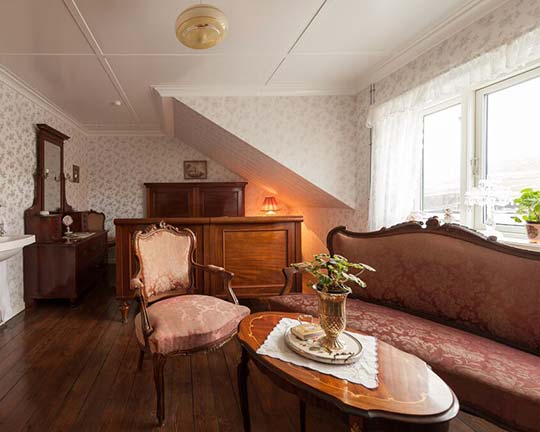
I had the unusual pleasure of observing ~30 elderly Faroese folk dine. It was a sociological throwback to a university Group Communications course in which I learned about ‘mien tsu‘ (aka the same ‘face’ from the phrase “saving face”) and the importance of a noisy meal from Victoria Chen‘s essay The Chinese Dinner Table. Where that piece was a scholarly dive into an intricate social dynamic of Chinese culture, this post will be more of an bewildered first-hand rambling.
It was brunch time at Magenta in Midvaagur, my home base in the Faroe Islands. The renovated building from the 50’s is chock-full of antique china and restored furniture — aka the perfect spot for those thirsting for a taste of the past. The business is multi-faceted: sometimes it’s a guesthouse, sometimes it’s a cafe, sometimes it’s a bakery, and sometimes it’s a museum. Today, Magenta was a banquet hall for a party of hungry great grandparents.
As a guest at the guesthouse, I could roam freely throughout unoccupied rooms; Magenta generally has a no-locking policy. I decided to snag a chair by the window and sip some water while watching the uncanny group file in to the ornate dining space before me.

The guests mumbled to one another (communicating and reacting slowly) until the first Magenta server brought the first dish to the table. The chairs creaked, the porcelain hit the tablecloth… then, silence…
Every single person at the table said nothing, perhaps even holding their breath. And it continued: for the ~5 minutes that the servers brought out and placed the first course, the only noises were clangs of glasses and dishes from the kitchen. My American sense of awkwardness had me shivering throughout my entire body.
‘Why aren’t they commenting? Is there really nothing to talk about? Nothing weird or funny about this situation? Surely at least one of these 30 men and women have something to say! The poor waitstaff… they must feel like they’re doing something really wrong.’
Then, something wonderful happened. After all of the food was on the table, the Faroese men and women nodded to an un-sounded rhythm, establishing a beat. A breath in unity — followed by a haunting a capella folk song. The sea folk sang in octaves, some voices cracking with age, all with a weathered fervor. The hymn lasted a few minutes before halting into another wave of utter silence.
And then they ate without words for their entire 2-hour meal.
Afterward, once the ice cream was devoured and belts were unbuckled, the Faroese started queueing up for a smoke break on the patio. Only then was the silence gradually, cautiously, cracked. Compliments for the chef began spilling out (the chef glowed, wrapped up in affirmation). The laughs and coughs of old men emboldened. Normalcy was restored. Everyone slowly waddled into an idling van and was carted away. A sigh of relief from Magenta’s staff, and an air of accomplishment.

Confused and fascinated, I immediately went to my young Faroese friend for an explanation of this custom of quietness:
“Today, the Faroese live in a society of wealth and groceries. If you want to eat a certain meal, you can buy it easily with the money that you easily have. But for those people, when they were growing up, it wasn’t like that. Even as recently as 20 years ago, we had to be much more conservative on our islands. Imports were not regular, and it was still necessary that we lived off our land, that we shared with our neighbors, and that we traded fairly for survival.
A nice big meal, like what the old people just ate, that was seen as something that only comes a few times in life. A real celebration. I remember even when I was a kid, there were some days where all we could have was whale, or dry fish or boiled potatoes or mutton — of course we loved it, and we still do, but back then we didn’t realize it meant not having much. We had money sometimes, sure… it was more that the food was simply not there.
So as a result it is a custom in the Faroes not to speak during a meal out of respect. Respect for the fishermen that risked themselves to get the food, and for the opportunity you have in eating it. It’s impolite to talk! And a meal that is several courses like today feels like Christmas dinner to those guests. A really special moment in time.
My grandma still gets mad if I talk during a meal…but, because I’ve been abroad, I sometimes feel awkward, like I guess you did, just sitting and chewing in silence. I get how it seems weird to outsiders.”
So perhaps the Faroese dining table values are, in many ways, exactly the opposite to Chinese customs. I don’t know, I’m not a sociologist. But what I do know that this experience was a fascinating glimpse into the strong and battered culture of the elusive Faroese.
Header image via Hotel Magenta